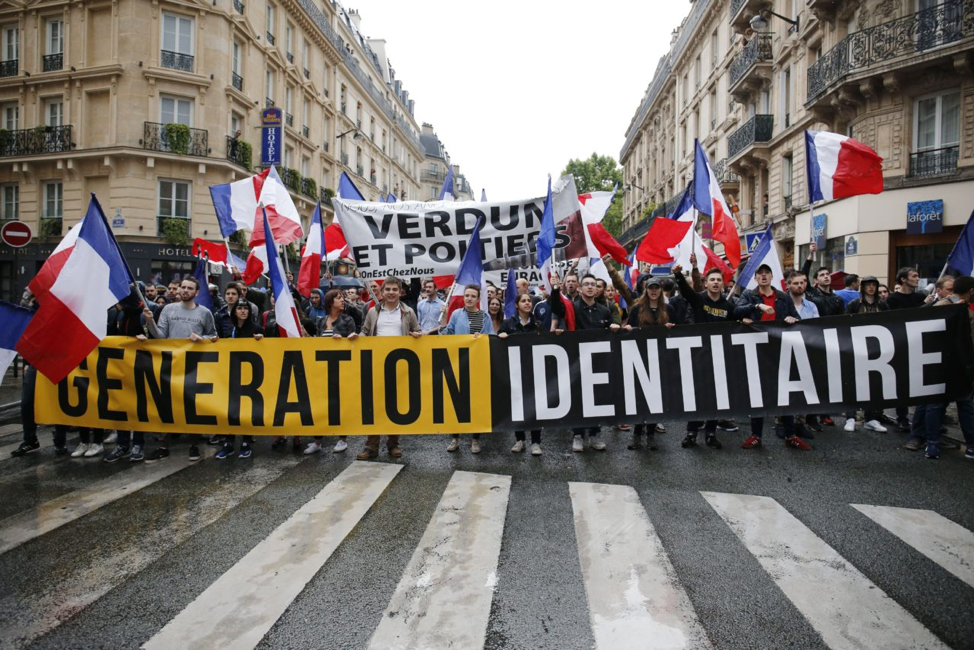Defending ‘European Identity’? The Dubious Struggle of Génération identitaire
20 March 2018 /

While far right political parties usually emphasise the promotion of one specific country’s national identity, Génération Identitaire stands out in the protection of European values. This far-right youth wing political movement, originating from France, indeed seeks to promote a very specific European identity, going against the values the European Union is actually protecting.
A Pan-European Nationalist Movement with ‘European’ Values?
Génération Identitaire (GI) was established in 2012 in France, stemming from a bigger movement called Les Identitaires (or previously Bloc Identitaire), and advocating for a new generation of active European citizens. The movement spread across the European continent and now has prominent affiliated groups in the United Kingdom, Germany, Austria and Italy (e.g. Generation Identity, Identitäre Bewegung and Generazione Identitaria).
Génération Identitaire seeks to bring together young Europeans around a common cause: the defence of Europe. Defence… but against what? According to the activists of GI, the identity and the future of Europe are both in danger due the “Islamisation of Europe” and the “migrant invasion”. As a matter of fact, in terms of key thematic issues, migration makes up a large part of GI’s claims, and the group preaches some kind of Kulturkampf against Islam – Kulturkampf being understood as a process in which “Muslims as a group are stigmatized for cultural backwardness and religious fanaticism” (Nash, 2012, p. 9). Thus, GI clearly positions Islam as being one of the main current issues Europe is facing. In addition to these two external, partly interconnected factors – Islam and migration – GI also identifies liberals and previous generations allowing themselves to decide for others, as a problem for the empowerment of the new generation of engaged citizens.
Rewriting History and Taking Up Arms
If they like to picture themselves as victims of the intents and behaviours of previous generations, especially that of May ’68 with their too liberal and permissive ideas, the members of Génération Identitaire are said to be in a position to change the course of events with their “declaration of war “. They indeed put a lot of means in place to cope, among other things, with migratory pressure. In spite of proceedings to cut their financial support, the group purchased an anti-migrant ship, named “C-Star”. Their mission, under the name “Defend Europe”, is to intercept and prevent non-governmental organisations from rescuing migrants trying to cross the Mediterranean Sea.
Armed with warlike language, violence-based communication and repeated victimisation, this political movement aims to promote a European identity, far from the ideals of peace and tolerance that the EU seeks to protect. The activists use provocative slogans and videos encouraging racism and xenophobia; yet, the pan-European political movement seems to gain more and more supporters.
An Ethnic Sense of Being European?
As European identity has been studied in the academia for several decades already, it helps us to understand what kind of identity a nationalist group like GI wants to construct and promote. Indeed, two main types of nationalism can be found in the literature: either with a civic or ethnic understanding (Brubacker, 1992). If the civic identity relies more on legal mechanisms in acceptance with socio-political system, the ethnic conception “focuses on how common religion, language, national traditions, ancestry and membership in a dominant ethnic of racial group are the bases for national membership” (Fligstein, Polyakova & Sandholtz, 2012, p. 122). European identity usually tends to be understood in its civic form, as identifying with European identity would mean to agree with some values – even if the EU does not define an identity per se, values can be found in Article 2 of The Lisbon Treaty. Nonetheless, the roots based on Christianity and common history that Europeans are presumably sharing have been the argument used by right-wing political parties across Europe (Holmes, 2009). Therefore, stemming from history one could find an “ethnic-based version of European identity that excludes certain groups from the vision of Europeanness” (Fligstein, Polyakova & Sandholtz, 2012, p.113).
As an identity – be it national, supranational or even individual – is constructed in relation to ‘the other’, whether in opposition or in accordance with its ideas, the members of Génération Identitaire are claiming that Muslim immigrants are a threat to their identity, hence trying to develop of a feeling of European belonging. If excluding outsider groups is a well-known technique used by far-right parties (Mudde, 2007), one has to be careful with Génération Identitaire, as the violence advocated by the movement and the political incorrectness of their words and actions are far beyond understanding.
Elodie Thevenin is studying for a Double Degree Programme in European Studies at Jagiellonian University, Krakow, Poland and the Institute of Political Studies in Strasbourg, France.
References
Brubacker, R. (1992). Nationalism Reframed. Cambridge University Press.
Fligstein, N., Polyakova, A. & Sandholtz, W. (2012). European Integration, Nationalism and European Identity. Journal of Common Market Studies. Volume 50. Number S1. Pp. 106-122.
Holmes, D. R. (2009). Experimental Identities (after Maastricht). In: J. T. Checkel & P. J. Katzenstein (Eds.), European Identity. Cambridge University Press.
Mudde, C. (2007). Populist Radical Right Parties. Cambridge University Press.
Nash, G. (2012). Writing Muslim Identity. Continuum.
